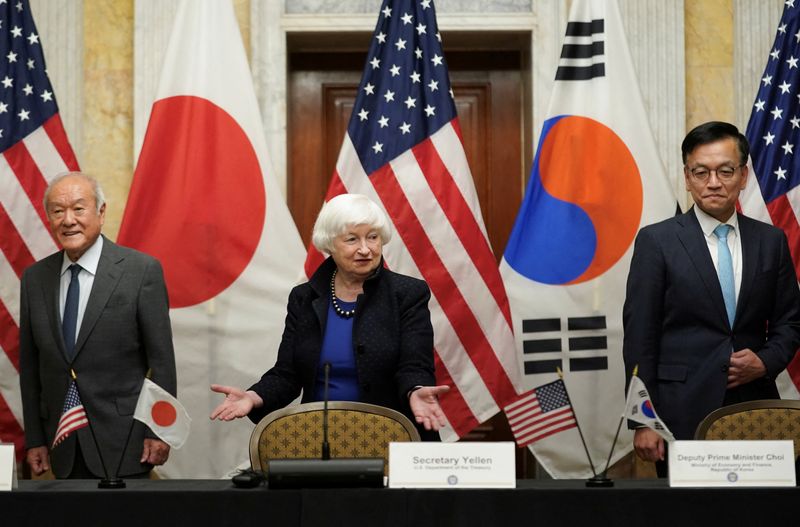By Leika Kihara
WASHINGTON (Reuters) -The United States, Japan and South Korea agreed to "consult closely" on foreign exchange markets in their first trilateral finance dialogue on Wednesday, acknowledging concerns from Tokyo and Seoul over their currencies' recent sharp declines.
The rare warning from the three countries' finance chiefs came as receding expectations of a near-term U.S. interest rate cut pushed the yen to 34-year lows, keeping markets on alert on the chance of an intervention by Japan to prop up the currency.
"We will continue to cooperate to promote sustainable economic growth, financial stability, as well as orderly and well-functioning financial markets," according to a joint statement released after the trilateral meeting.
"We will also continue to consult closely on foreign exchange market developments in line with our existing G20 commitments, while acknowledging serious concerns of Japan and the Republic of Korea about the recent sharp depreciation of the Japanese yen and the Korean won," it said.
The dollar slid to an intraday low of 154.18 yen after the statement, off the 34-year high of 154.79 yen hit on Tuesday. It stood at 154.24 yen in Asia on Thursday. Japan last intervened in October 2022 when the yen was at 151.94 per dollar.
Washington's acknowledgement of the currency concerns from Tokyo and Seoul may lay the groundwork for intervention, some analysts said.
"While I don't see a statement like this being enough to boost the yen and avoid an intervention, the language used there is pretty strong and I wouldn't be surprised to see some concrete moves come out of Japan before the week is out," said Helen Given, a currency trader at Monex USA.
The trilateral gathering, attended by U.S. Treasury Secretary Janet Yellen, Japanese Finance Minister Shunichi Suzuki and South Korean Finance Minister Choi Sang-mok, was held on the sidelines of the International Monetary Fund and Group of 20 (G20) finance leaders' meetings this week in Washington.
Suzuki told reporters he also met Yellen bilaterally on Wednesday and explained Tokyo's readiness to take appropriate action against excessive yen moves, without elaborating.
Japan's top currency diplomat Masato Kanda, who is also in Washington, said authorities would not rule out any options in dealing with excessive yen moves.
He declined to comment, when asked about the possibility of coordinated intervention to slow the dollar's ascent against other currencies, including the yen.
"In the last few intervention cycles, American authorities - most notably Janet Yellen - issued statements acknowledging Japan's motivations and providing verbal support," said Karl Schamotta, chief market strategist at Corpay.
"From a strategic perspective, currency intervention is far more likely to succeed when delivered through a coordinated international effort. Unilateral moves are helpful in mitigating volatility, but aren't up to the task of reversing the yen's long rate differential-driven slide," Schamotta said.
Finance leaders of the G7 advanced nations agreed to a Japanese proposal to reaffirm their commitment that excessive volatility and disorderly moves in the currency market were undesirable, Kanda told reporters after the G7 gathering.
LASTING EFFECT UNLIKELY
Japan and South Korea have seen their currencies slide against the dollar in recent weeks due largely to reduced bets of near-term cuts to elevated U.S. interest rates.
Verbal warnings by Japanese authorities have failed to keep traders from pushing the yen down near 155 to the dollar, a level seen as Tokyo's line-in-the-sand that heightens the chance of intervention.
Bank of Korea Governor Rhee Chang-yong said on Wednesday authorities have the resources and tools to smooth out any volatile moves in the country's currency, signaling readiness to intervene in the market to shore up the won.
"Our exchange rate deviated a little bit from what could be justified by market fundamentals," Rhee said in an IMF seminar.
Finance leaders of the G20 major economies have a long-standing agreement that excessive exchange-rate volatility and disorderly currency moves are undesirable.
Tokyo has argued this G20 agreement gives it freedom to intervene in the currency market to counter excessive yen moves.
But intervention could be costly and there is no guarantee it could reverse the current strong-dollar tide, which is driven by the big gap between U.S. and near-zero Japanese interest rates.
"I'm not sure whether Tokyo would intervene just because the dollar breaks past 155 yen," said Masafumi Yamamoto, chief FX strategist at Japan's Mizuo Securities.
"Authorities probably feel that solo intervention won't have a lasting effect when a strong U.S. economy is pushing back the timing of a Fed rate cut and driving up the dollar," he said.
